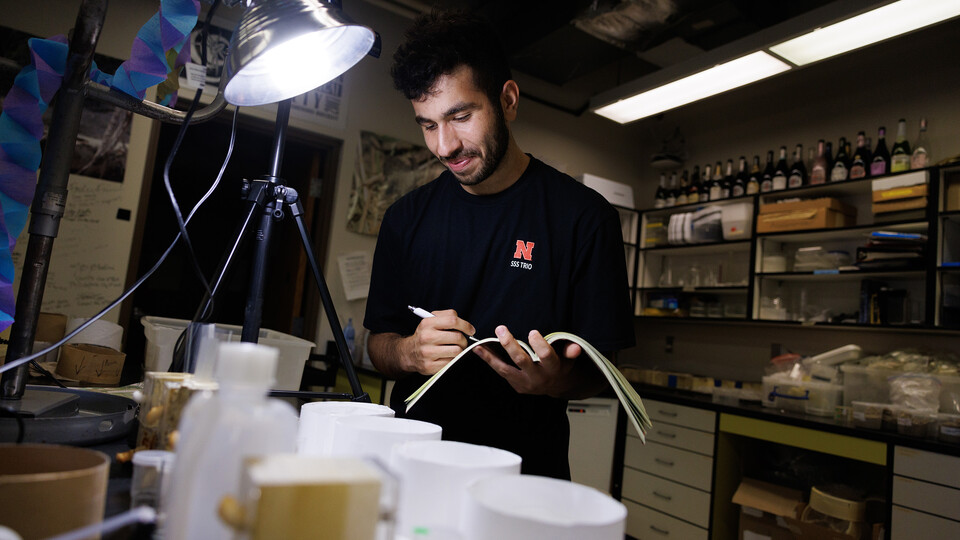
by Deann Gayman | University Communication and Marketing
Abdallah Abdallah spent his summer studying spiders with shaved legs. Working in a lab under the mentorship of Eileen Hebets, George Holmes Professor in the School of Biological Sciences, Abdallah ran numerous experiments and collected data on the mating attitudes of female spiders after removing hairs from the males’ legs.
The opportunity to investigate arachnid attraction was unique, unexpected and fun, but it also taught Abdallah new research skills and boosted his confidence as he begins his first year of college, majoring in electrical engineering.
“Being on campus has been really helpful,” Abdallah said. “It has been a really good experience and fun to learn new things. I’m excited to get started.”
Abdallah’s experience encapsulates the goals of the STEM-POWER Research Program, which brings incoming first-year students from underrepresented populations onto campus to complete summer research, build community and receive mentorship from professors and peers. The program is housed in the School of Biological Sciences, but students receive research opportunities and mentorship from faculty in the departments of biochemistry, chemistry and mathematics, as well.
STEM-POWER has received national recognition through an Inspiring Programs in STEM Award from INSIGHT into Diversity magazine. The award recognizes programs that are making a difference for all underrepresented groups in the fields of science, technology, engineering and mathematics. Inspiring Programs in STEM Award winners were selected by INSIGHT Into Diversity based on efforts to inspire and encourage a new generation of young people to consider careers in STEM through mentoring, teaching, research, and successful programs and initiatives.
Through the NSF grant, the program is being evaluated to find those successes, build on them and identify areas for growth and improvement. Trish Wonch Hill, research associate professor in the Center for Mathematics and Computer Education and co-principal investigator on the grant, is overseeing the evaluation and social science research objectives of the project.
STEM-POWER was piloted as the Upward Bound Math-Science Summer Research Bridge Program with nine students in 2021 and 12 students in 2022, thanks to capital from the School of Biological Sciences. It has since been fully funded for five years through a National Science Foundation grant. This past summer, 14 local scholars went through the program. Plans are in place to grow the program by offering opportunities to more students beyond Lincoln.
The program launched after a group of colleagues in the School of Biological Sciences and the UNL TRIO programs brainstormed ideas to support underrepresented students toward preparing and succeeding in STEM collegiate studies.
“It was super important to assure that all students have equitable access to STEM careers,” Mike Herman, professor and the school’s director, said. “We wanted to find some ways we could make a more significant impact in a shorter period of time. We looked at where the gaps were that we thought might be hindering our ability to really have more representation among students who are pursuing STEM careers. And how can we knock down some of the barriers that exist?”
To help knock down those barriers, the mentorship piece of the program is extremely important. STEM-POWER scholars are typically paired up and have a peer mentor and faculty mentor, which creates a small community of support at the outset of the program. Kristi Montooth, Susan Rosowski Professor in biological sciences and principal investigator on the NSF grant, said that community plays an important role as students move through their collegiate careers and beyond.
“We thought we might be losing a population of students who, if they had better relationships really early on, they would be more likely to stick with their major or find their true passion,” Montooth said. “My motivation for being involved has just been the value I find in research mentorship for undergrads. When I was a student myself, my research mentors were incredibly empowering for me. I didn’t see it that way then, but when I look back, I think ‘Wow, I’m not sure I would even be on the path I’m on or have the confidence I do it if it wasn’t for them.’”
Students apply for STEM-POWER and are interviewed to match their interests and career goals with mentors and research projects. They’re required to spend 20 hours per week on campus for eight weeks. Students receive a stipend for their research work and attend professional development activities.
Marianna Burks, assistant professor of practice and co-principal investigator on the funding grant, leads STEM-POWER and said most students who’ve gone through the program have continued to find success in their chosen STEM fields.
“Students from the pilot cohort continued with student research through the First Year Research Experience, and then UCARE or through other opportunities,” Burks said. “For example, Manal Aman spent this summer at the University of Nebraska Medical Center conducting research.
“She was one of those initial students (from 2021) that truly did exactly what STEM-POWER was intended to do — to retain underserved students in STEM. She identified herself as a researcher after her first summer in our bridge program, and she’s continued on.”